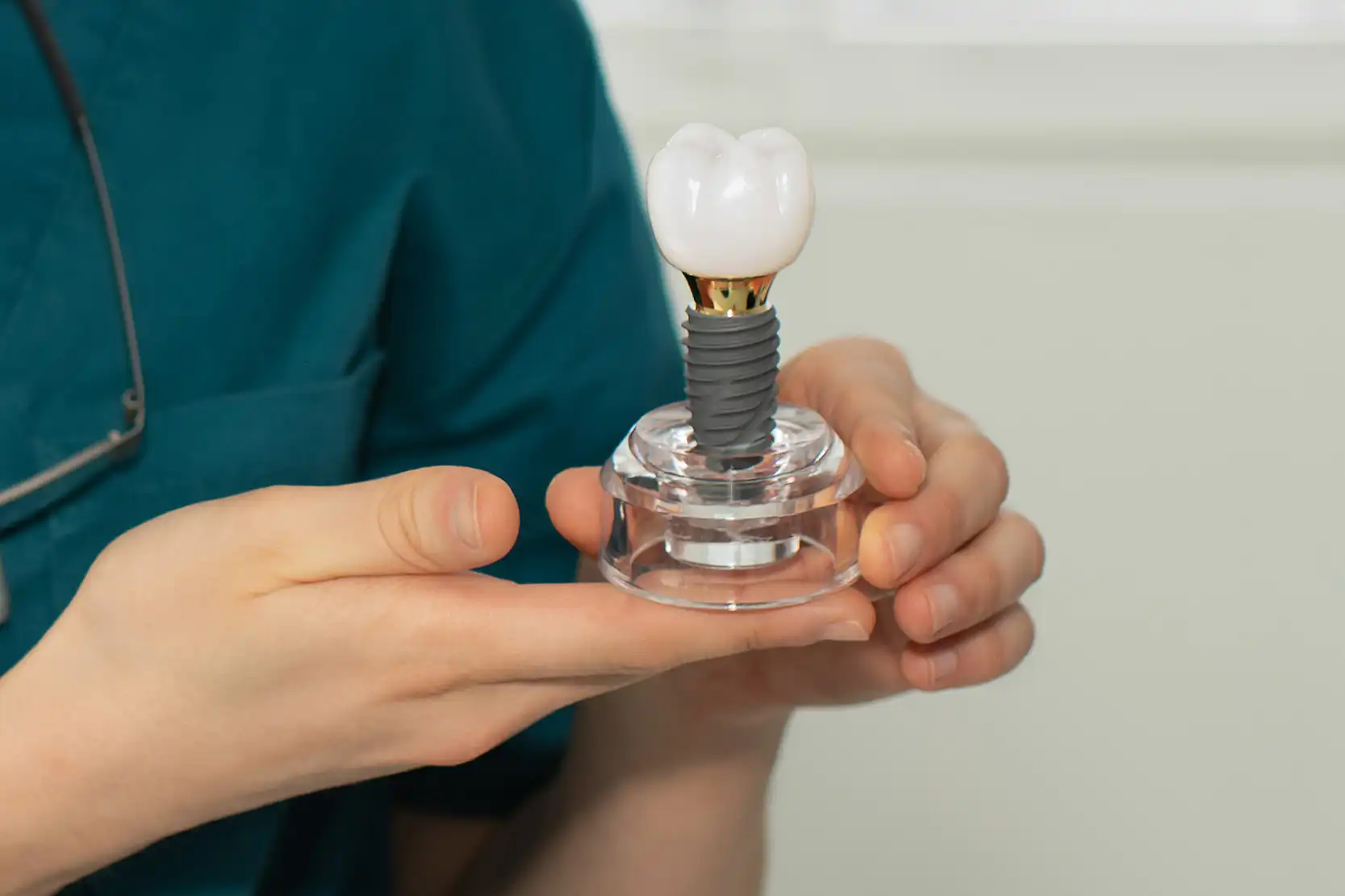Diş İmplantı İyileşme Aşamaları: İmplant Sonrası Bakım Rehberi
Diş İmplantı İyileşme Aşamaları: İmplant Sonrası Bakım Rehberi
"Diş implantı operasyonu sonrası iyileşme süreci ve bakım önerileri ile implantınızın sağlıklı kaynaşmasını sağlayın. Ağız hijyenine dikkat ederek uzun ömürlü kullanım için ipuçları!
İçindekiler:
Diş İmplantı Cerrahisi Sonrası İyileşme
Diş implantı cerrahisinden sonra iyileşme süreci, belirli aşamalardan oluşur ve her aşama farklı zaman dilimlerinde gerçekleşir. İyileşme sürecinde en önemli adımlardan biri, implantın çene kemiği ile bütünleşmesi süreci olan osseointegrasyondur.
✔️ Osseointegrasyon: Çene kemiğinin implant çevresinde büyüyerek implantı doğal bir diş kökü gibi sarmasıdır.
✔️ İyileşme Süresi: Genellikle 2 ila 6 ay arasında sürer.
Diş İmplantı İyileşme Aşamaları Nelerdir?
İmplant yerleştirme işlemi tamamlandıktan sonra iyileşme süreci üç ana aşamadan oluşur:
1️⃣ İlk Aşama: İmplantın Yerleştirilmesi ve İlk İyileşme
Ne Olur? İmplant çene kemiğine cerrahi müdahale ile yerleştirilir.
Yan Etkiler: Şişlik, morluk, hafif ağrı ve kanama olabilir.
Süre: İlk 1-2 hafta kritik dönemdir.
🩺 Bakım Önerileri:
İlk 24 saat tükürmekten kaçının.
Soğuk kompres uygulayarak şişliği azaltın.
Doktorunuzun verdiği ilaçları düzenli kullanın.
2️⃣ İkinci Aşama: Osseointegrasyon Süreci (Kemik İyileşmesi)
Ne Olur? Çene kemiği, implantın çevresinde büyüyerek implantı sabitler.
Yan Etkiler: Genellikle belirgin bir rahatsızlık yaşanmaz.
Süre: 2 ila 6 ay sürebilir.
🔹 Neden Bu Kadar Önemli?
Osseointegrasyon gerçekleşmezse implant başarısız olabilir. Bu yüzden sigara içmek, sert yiyeceklerden kaçınmak ve ağız hijyenine dikkat etmek bu aşamada çok önemlidir.
3️⃣ Üçüncü Aşama: Abutment ve Protez Yerleştirilmesi
Ne Olur? İmplantın üzerine abutment adı verilen destek parçası takılır. Daha sonra ölçü alınır ve kalıcı protez (kron) yerleştirilir.
Süre: Abutment takıldıktan sonra diş eti iyileşmesi 1-2 hafta sürer.
💡 Önemli Bilgi:
İmplant üzerine dişin yerleştirilmesi genellikle implant yerleştirildikten 6 ay sonra yapılır.
Diş İmplantı Sonrası Ağrı Ne Kadar Şiddetlidir?
İmplant operasyonu sırasında lokal anestezi kullanıldığından herhangi bir ağrı hissetmezsiniz. Ancak operasyon sonrası hafif ila orta derecede ağrı ve rahatsızlık olabilir.
🛑 Ağrı Seviyesi:
İlk 3 gün ağrı ve şişlik normaldir.
1 haftadan sonra ağrının azalması beklenir.
Diş İmplantı Sonrası Ağrı Ne Kadar Sürer?
Diş implantı operasyonu sonrasında ağrı genellikle kısa süreli olup, çoğu hastada 3 ila 5 gün içinde azalır. Ağrının yoğunluğu kişiden kişiye değişebilir; ancak bu süreçte diş hekiminizin reçete ettiği ağrı kesicilerle bu rahatsızlığı hafifletmek mümkündür.
Ağrıyı Hafifletme Yolları
İmplant sonrası ağrı ve rahatsızlığı azaltmak için şu adımları izleyebilirsiniz:
Ağrı Kesici Kullanımı
Diş hekiminizin önerdiği ağrı kesicileri düzenli kullanın.
İbuprofen ya da parasetamol gibi reçetesiz ağrı kesiciler etkili olabilir.
Soğuk Kompres Uygulama
İlk 24 saat boyunca, şişliği azaltmak için 10 dakika soğuk kompres uygulayın ve 10 dakika ara verin.
Yumuşak ve Ilık Gıdalar Tüketin
Sıcak, sert ve baharatlı yiyeceklerden kaçının.
Çorba, yoğurt, muhallebi gibi kolay çiğnenebilir yiyecekleri tercih edin.
Dinlenme ve İyileşme
İlk gün dinlenin ve birkaç gün boyunca fiziksel aktivitelerden kaçının.
Başınızı yüksek bir yastıkta tutarak uyuyun.
Sigara ve Alkolden Kaçının
Sigara, implant bölgesinde iyileşmeyi yavaşlatabilir ve enfeksiyon riskini artırabilir.
Hijyen Kurallarına Dikkat Edin
Diş hekiminizin tavsiye ettiği ağız bakım ürünlerini kullanın.
Antiseptik gargara ile ağız hijyeninizi koruyun.
Diş İmplantı Sonrası Yaygın Yan Etkiler
Diş implantı sonrası bazı yan etkiler yaşanabilir. Ancak bunlar genellikle hafif ve geçicidir. İşte dikkat edilmesi gerekenler:
1️⃣ Ağrı ve Rahatsızlık:
İmplant cerrahisi sonrası hafif ila orta derecede ağrı olabilir.
Ağrı, genellikle ilk 3-5 gün içinde azalır.
İbuprofen veya Parasetamol gibi ilaçlarla kontrol altına alınabilir.
2️⃣ Şişlik ve Morluk:
İlk 2-3 gün boyunca yanak ve çene bölgesinde şişlik olabilir.
Şişlik, soğuk kompres ile azaltılabilir.
Yüzde morarma oluşabilir, ancak birkaç gün içinde geçer.
3️⃣ Kanama:
İlk 24 saat içinde hafif kanama normaldir.
Temiz bir gazlı bezi implant bölgesine yerleştirip 30 dakika hafifçe bastırın.
Kanama 24 saatten uzun sürerse diş hekiminize başvurun.
4️⃣ Enfeksiyon Riski:
İmplant çevresinde kızarıklık, şişlik, kötü koku ve ateş enfeksiyon belirtisi olabilir.
Diş hekiminizin reçete ettiği antibiyotikleri düzenli kullanın.
Düzenli gargara yaparak ağız hijyenini koruyun.
5️⃣ Sinir Hasarı (Nadir):
İmplantın sinire yakın bölgelerde yerleştirilmesi durumunda hafif uyuşma olabilir.
Genellikle geçicidir, ancak uzun sürerse diş hekiminizle iletişime geçin.
Diş İmplantı Sonrası İyileşme Sürecini Hızlandırmak İçin Öneriler
Diş implantı sonrası iyileşme süreci kişiden kişiye değişebilir. Ancak, iyileşmeyi hızlandırmak ve olası komplikasyonları önlemek için aşağıdaki önerilere uymanız önemlidir.
1. Dinlenme ve Ağır Aktivitelerden Kaçının
İlk birkaç gün dinlenin ve ağır fiziksel aktivitelerden uzak durun.
Ağır kaldırma, egzersiz veya ani hareketlerden kaçının çünkü bunlar cerrahi bölgedeki kan akışını artırabilir ve iyileşmeyi geciktirebilir.
2. Ağrı ve Şişliği Yönetme
Reçetesiz ağrı kesiciler (İbuprofen, Parasetamol vb.) kullanarak ağrıyı kontrol altına alın.
İlk 48 saat boyunca her saat başı 10-15 dakika boyunca soğuk kompres (buz torbası) uygulayın. Bu, şişliği ve rahatsızlığı azaltacaktır.
Sıcak yiyecek ve içeceklerden kaçının, çünkü bunlar cerrahi alanı tahriş edebilir.
3. Ağız Hijyenine Dikkat Edin
İlk birkaç gün boyunca dişlerinizi yavaş ve dikkatli bir şekilde fırçalayın, ameliyat bölgesine temas etmekten kaçının.
Diş ipi kullanmayın veya cerrahi bölgeyi ovalamayın.
Hekiminizin önerdiği antiseptik gargaralar ile ağzınızı düzenli olarak çalkalayın.
Tuzlu suyla gargara yapabilirsiniz, ancak çok güçlü çalkalamaktan kaçının.
4. Sigara ve Alkolü Bırakın
Sigara içmeyin! Sigara, yara iyileşmesini ciddi şekilde geciktirir ve enfeksiyon riskini artırır.
Alkol tüketimini sınırlayın, çünkü alkol, ilaçlarla etkileşime girerek iyileşmeyi olumsuz etkileyebilir.
5. Yumuşak ve Besleyici Gıdalar Tüketin
Sert, yapışkan veya gevrek gıdalardan kaçının, çünkü bunlar implant bölgesine zarar verebilir.
Önerilen yiyecekler:
Yoğurt, püre, haşlanmış sebzeler
Ilık çorbalar
Muz, avokado gibi yumuşak meyveler
Yulaf ezmesi veya smoothieler
Baharatlı ve asidik yiyeceklerden kaçının, çünkü bunlar ağızda tahrişe neden olabilir.
6. Gereksiz Çene Hareketlerinden Kaçının
Çene ve dudak hareketlerini minimumda tutun.
Dikişleri ve iyileşme alanını zorlamamak için aşırı konuşmaktan kaçının.
7. Olası Komplikasyonlara Karşı Dikkatli Olun
Aşağıdaki belirtilerden herhangi birini yaşarsanız diş hekiminize danışın:
Şiddetli ve geçmeyen ağrı
Aşırı kanama veya uzun süre devam eden şişlik
Cerrahi bölgeden kötü koku veya iltihap akıntısı
Aşırı hassasiyet veya uyuşma hissi
8. Düzenli Kontrolleri Aksatmayın
Diş hekiminizin planladığı kontrol randevularına düzenli olarak gidin.
İmplantın başarılı bir şekilde çene kemiğiyle kaynaştığını görmek için röntgen kontrolleri önemlidir.
İmplantınız İçin Uzun Vadeli Başarı İçin Sabırlı Olun!
Diş implantı süreci sabır ve özen gerektirir. Yukarıdaki önerilere dikkat ederek iyileşme sürecinizi hızlandırabilir ve uzun ömürlü, sağlıklı bir diş implantına sahip olabilirsiniz.
Sorularınız veya endişeleriniz varsa, diş hekiminize danışmayı unutmayın!
Sources:
- https://www.guysandstthomas.nhs.uk/health-information/dental-implants/after-having-dental-implant
- https://www.mayoclinic.org/tests-procedures/dental-implant-surgery/about/pac-20384622
- https://www.webmd.com/oral-health/dental-implants
- https://www.healthline.com/health/dental-and-oral-health/dental-implant-procedure
- https://www.healthline.com/health/dental-and-oral-health/dental-implant-pain#intense-pain-causes
Ücretsiz danışmanlık almak için doldurun
her implantta yenilik ve hassasiyet
ömür boyu gülüşler için güçlü temeller sağlayan implantlar kullanıyoruz
BioTec Dental Implants


Hiossen Dental Implants


Straumann Dental Implants


Nobel Biocare Dental Implants


MegaGen Dental Implants


ışıltılı gülüşler ebedi olarak yakalanır
gerçek gülüşler gerçek sözler hastalarımızın hikayeleri






